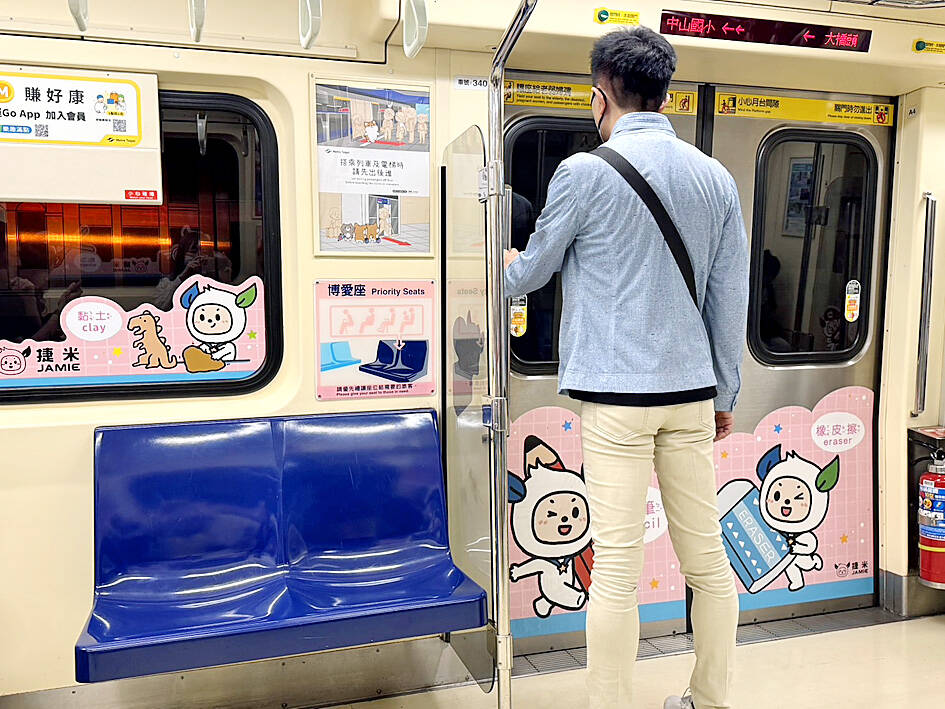The legislature’s Social Welfare and Environmental Hygiene Committee yesterday gave preliminary approval to a proposed amendment to Article 53-3 of the People with Disabilities Rights Protection Act (身心障礙者權益保障法), which would change the term used in Mandarin from “courtesy seat” to “priority seat,” and expand the eligibility to include all people with actual needs.
The committee also passed a motion proposed by Democratic Progressive Party Legislator Liu Chien-kuo (劉建國), which would ask the Ministry of Transportation and Communications and the Ministry of Health and Welfare to design a new sign for priority seats that can be used on buses, trains and Mass Rapid Transit systems nationwide.
The two ministries should launch an awareness campaign of the new policy governing the use of priority seats and public transport operators should support the awareness campaign by broadcasting the new policy on board, the motion says.

Photo: CNA
The current article requires public transportation facilities to set aside priority seats for disabled and elderly people, women and children at a rate of no less than 15 percent of the total seats available. Such seats should be close to the car or cabin doors. The floor between the priority seats and the exits should be flat and without any obstacles, and, if necessary, marked with yield seats warnings, the article says.
Minister of Health and Welfare Chiu Tai-yuan (邱泰源) said that changing the name from “courtesy seat” to “priority seat” reflects the spirit of love and inclusiveness associated with the seats.
It sends a positive message about mutual support and care within society, he added.
The Ministry of Transportation and Communications said that the relevant sub-regulations would be revised within six months following the promulgation of the amendment.
Passenger disputes over priority seats on public transportation have been reported frequently, sparking a nationwide debate about who qualifies to sit in them. Most of the cases involved elderly people asking young people to give up their seats.

NATIONAL SECURITY THREAT: An official said that Guan Guan’s comments had gone beyond the threshold of free speech, as she advocated for the destruction of the ROC China-born media influencer Guan Guan’s (關關) residency permit has been revoked for repeatedly posting pro-China content that threatens national security, the National Immigration Agency said yesterday. Guan Guan has said many controversial things in her videos posted to Douyin (抖音), including “the red flag will soon be painted all over Taiwan” and “Taiwan is an inseparable part of China,” while expressing hope for expedited “reunification.” The agency received multiple reports alleging that Guan Guan had advocated for armed reunification last year. After investigating, the agency last month issued a notice requiring her to appear and account for her actions. Guan Guan appeared as required,

A strong cold air mass is expected to arrive tonight, bringing a change in weather and a drop in temperature, the Central Weather Administration (CWA) said. The coldest time would be early on Thursday morning, with temperatures in some areas dipping as low as 8°C, it said. Daytime highs yesterday were 22°C to 24°C in northern and eastern Taiwan, and about 25°C to 28°C in the central and southern regions, it said. However, nighttime lows would dip to about 15°C to 16°C in central and northern Taiwan as well as the northeast, and 17°C to 19°C elsewhere, it said. Tropical Storm Nokaen, currently

PAPERS, PLEASE: The gang exploited the high value of the passports, selling them at inflated prices to Chinese buyers, who would treat them as ‘invisibility cloaks’ The Yilan District Court has handed four members of a syndicate prison terms ranging from one year and two months to two years and two months for their involvement in a scheme to purchase Taiwanese passports and resell them abroad at a massive markup. A Chinese human smuggling syndicate purchased Taiwanese passports through local criminal networks, exploiting the passports’ visa-free travel privileges to turn a profit of more than 20 times the original price, the court said. Such criminal organizations enable people to impersonate Taiwanese when entering and exiting Taiwan and other countries, undermining social order and the credibility of the nation’s

‘SALAMI-SLICING’: Beijing’s ‘gray zone’ tactics around the Pratas Islands have been slowly intensifying, with the PLA testing Taiwan’s responses and limits, an expert said The Ministry of National Defense yesterday condemned an intrusion by a Chinese drone into the airspace of the Pratas Islands (Dongsha Islands, 東沙群島) as a serious disruption of regional peace. The ministry said it detected the Chinese surveillance and reconnaissance drone entering the southwestern parts of Taiwan’s air defense identification zone early yesterday, and it approached the Pratas Islands at 5:41am. The ministry said it immediately notified the garrison stationed in the area to enhance aerial surveillance and alert levels, and the drone was detected in the islands’ territorial airspace at 5:44am, maintaining an altitude outside the effective range of air-defense weaponry. Following